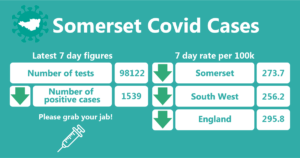Welcome to the latest edition of the weekly Somerset Covid-19 update for key stakeholders. This update is produced on behalf of the Somerset Covid-19 Engagement Board and is designed to provide a weekly update on the current Covid-19 situation in Somerset.
On Tuesday, the Prime Minister announced the Covid-19 response: Autumn and Winter plan. The Government’s stated aim is to ‘sustain the progress made and prepare the country for future challenges, while ensuring the NHS does not come under unsustainable pressure’. The Government hopes to achieve this with ‘Plan A’ which can be summarised as follows:
- Building our defences through pharmaceutical interventions: vaccines, antivirals and disease modifying therapeutics
- Identifying and isolating positive cases to limit transmission: Test, Trace and Isolate.
- Supporting the NHS and social care: managing pressures and recovering services.
- Advising people on how to protect themselves and others: clear guidance and communications.
- Pursuing an international approach: helping to vaccinate the world and managing risks at the border.
It is clear that promoting personal responsibility, in particular a push aimed at those who have not had the vaccine to have it, forms a large part of the Government’s plans. As has been widely publicised, children aged 12-15 will be offered one dose, and a booster programme for millions of people will run alongside the winter flu vaccination programme.
In addition, as there is evidence people still do not fully appreciate the importance of ventilating indoor spaces, there will also be a campaign to explain this. We will be sharing all of this on our social media channels, so please do keep following us on Facebook, Instagram and Twitter.
As we all know, the pandemic remains unpredictable. The Government points out there are a number of variables including: levels of vaccination uptake among the population; how quickly, and how widely social contact returns to pre-pandemic levels as schools return and offices reopen; and whether a new variant emerges which fundamentally changes the Government’s assessment of the risks. In addition, winter is always a challenging time for health and care services. This winter could be particularly difficultdue to the impacts of Covid-19 on top of the usual increase in emergency demand and seasonal respiratory diseases such as flu.
There is considerable uncertainty over how these pressures will interact with the impact of Covid-19. Therefore, if Plan A is not sufficient to keep the virus at manageable levels, the Government’s document outlines a Plan B for England which would only be enacted if the data suggests further measures are necessary to protect the NHS. This includes options such as:
- the public being urged to act more cautiously
- mandatory vaccine passports being introduced for mass events and other settings
- face coverings being legally mandated in some places
Guidance on working from home may also be issued under this plan. As always, we will keep you updated as more information becomes available to us.
Latest Covid Dashboard: The following link below will take you to our website: Coronavirus (COVID-19) (somerset.gov.uk) Then scroll down the page until you get to ‘COVID-19 Dashboard’ in the list. Click on this and the dashboard will open.
‘Remember, everyone can catch it, anyone can spread it’.



| David Fothergill, Leader of Somerset County Council Twitter: @DJAFothergill | Trudi Grant, Director of Public Health Twitter: @SomersetDPH | Clare Paul, Cabinet Member for Public Health and Wellbeing Twitter: @Clarepaul_ |

In the week up to 11 September approximately 98122 tests were carried out across the county with 1539 new confirmed cases. The rates have decreased to 273.7 per 100,000, and we are now slightly below the national average of 295.8 per 100,000.
The main items featured in this week’s update are:
- Good practice reminder
- Workplace, care and school settings
- Vaccination update
- Testing Update
- Resources and further information
Good practice reminder: Along with our colleagues in the NHS we are reminding everyone of the simple measures we can all adopt, to avoid restrictions being placed on our day-to-day lives:
- Get vaccinated for Covid-19 and flu
- Get tested if you have symptoms and self-isolate
- Let fresh air into indoor spaces
- Stay at home if you are unwell with any illness to prevent the spread
- Wear a face covering in crowded and enclosed spaces
- Wash your hands
None of us want to get to the stage where the Government needs to activate Part B of the Autumn/Winter Plan, so please help us by sharing the messaging with your networks, to help us all stop spreading the virus.
Workplaces: To support businesses through the autumn and winter period, the Government will continue to provide up-to-date Working Safely guidance on how employers can reduce the risks in their workplace. Businesses should consider this guidance in preparing their health and safety risk-assessments and put in place suitable mitigations. In line with government guidance issued when step 4 took effect, an increasing number of workers have gradually returned, or are preparing to return, to offices and workplaces. As workers return to the workplace, employers should follow the Working Safely guidance.
Locally, we also have a wide range of local resources available to help, with posters, postcards and social media assets available to print and download.
By law, businesses must not ask or allow employees to come to work if they are required to self-isolate. In addition, businesses are encouraged to:
- Ask employees to stay at home if they are feeling unwell.
- Make sure there is an adequate supply of fresh air to indoor spaces. Businesses should identify any poorly ventilated spaces, for example by using a CO2 monitor, and take steps to improve fresh air flow in these areas.
- Provide hand sanitiser to enable staff and customers to clean their hands more frequently, and clean surfaces which people touch regularly.
- Display an NHS QR code poster for customers to check in using the NHS Covid-19 app, so they are alerted if there’s an outbreak and can take action to protect others.
- Consider using the NHS Covid Pass
During the coming months, if the data suggests the NHS is likely to come under unsustainable pressure, the Government has prepared a Plan B for England which could see people once again being asked to work from home if they can, for a limited period.
Care Sector: We continue to see cases of Covid-19 in social care settings and for the week ending 11 September 2021 there have been 71 cases at 49 settings across Somerset.
Temporary medical exemptions for vaccination as a condition of deployment. A temporary process has been introduced allowing people working or volunteering in care homes to self-certify they cannot have the Covid-19 vaccine for medical reasons.
Where people meet the criteria they should sign a declaration form and submit to their care home manager as soon as possible. They will need to have done this by 11 November 2021 to continue to work or volunteer inside a care home.
This self-certification process has been introduced temporarily until the launch of a new system. Once launched, people working or volunteering in a care home must apply for formal medical exemptions through the new process. For more information visit the GOV.uk website.
It will be mandatory for care home workers and volunteers to have Covid-19 vaccinations by 11 November 2021 unless they are exempt. Care workers are among priority groups eligible to receive Covid-19 booster vaccine. The Government has announced that millions of people will be offered a Covid-19 booster vaccine from next week.
Care home residents, health and care workers, people aged over 50, those aged 16 to 49 years with underlying health conditions which put them at higher risk, adult carers and adult household contacts of individuals with weakened immune systems will be prioritised.
More information. For information related to Covid-19 for adult care providers please visit Somerset Safeguarding Adults Board where you will information on reporting cases of Covid 19, support helplines, webinars and links to guidelines.
Schools and Early Years settings:
Vaccination Programme for 12-15 year olds: Following JCVI advice to consider the matter of vaccinating otherwise healthy 12-15 year olds from a broader perspective, UK Chief Medical Officers (UK CMOs) now judge it is likely vaccination will help reduce transmission of Covid-19 in schools. The view of the UK CMOs is that the additional benefits of reducing educational disruption, and the consequent reduction in public health harm from that disruption, provide sufficient advantage in addition to the marginal individual advantage identified by the JCVI to recommend in favour of vaccinating 12-15 year olds. Ministers have now accepted this advice.
Healthy school-aged children aged 12 to 15 will primarily receive one dose of the Covid-19 vaccination in their school, with alternative provision for those who are home schooled, in secure services or specialist mental health settings.
Parental, guardian or carer consent will be sought by vaccination healthcare staff prior to vaccination in line with existing school vaccination programmes. For more information visit the GOV.uk website.
Vaccination resources for schools can be found on on the GOV.uk website.
Home Testing: From next week, secondary school pupils, parents / guardians and staff should be testing twice a week at home. Schools need to keep adequate lateral flow test stocks to manage this and communicate with pupil’s households to underline the importance of regular asymptomatic testing.
As a reminder, anyone with a positive result on a lateral flow test should book a confirmatory PCR test. Anyone with symptoms of Covid-19 should not attend school and should book a PCR test.
Winter Readiness: This year all children from aged two; up to and including year 11 will be offered the flu vaccine. School aged children will be offered the vaccine at school, via their local school aged immunisation provider.
Please visit the Somerset County Council Covid-19 School Toolkit for guidance and information on managing cases in educational settings.
Vaccination Update:
Third vaccination dose booster: People over 50, care home residents, health and social care workers, and those aged 16 to 49 years with severely weakened immune systems will be offered a third Covid-19 vaccine dose. We will keep you updated about this programme as it is rolled out.
For the latest information about the Somerset vaccination programme visit the NHS website.
You can go online and phone 119 to book your vaccination appointment, or alternatively, use this link to find out more about where the local ‘Grab a Jab’ clinics are taking place this week.
It remains very important for anyone who has not had their first or second dose of the Covid-19 vaccine, to get it as soon as possible. While the first dose starts to provide some immunity, it is only two weeks after the second dose when you are considered to be ‘fully vaccinated’.
Do you have, or know someone who has concerns over receiving the Covid-19 Vaccine? We have a team of trained Vaccination buddies who are here to help! The programme enables people to be offered support via a ‘buddy’ who can help them to make informed decisions about having the Covid-19 vaccination. People can be referred (or self-refer) to the scheme and a Vaccination Buddy will contact them by phone to discuss their concerns and offer information and reassurance. Vaccination Buddies come from all walks of life and have the necessary skills and knowledge to support people in a friendly, non-judgemental way. We also have an excellent video introducing one of our Vaccination Buddies which can be viewed on YouTube.
Testing: In the Autumn and Winter Covid-19 response plan, the following was confirmed regarding testing:
- The Government will continue to expect everyone with Covid-19 symptoms to self-isolate and take a PCR test. The legal requirement to self-isolate for 10 days if an individual tests positive for Covid-19 will remain in place in order to prevent those who are infected from mixing in the community and passing on the virus.
- PCR testing will remain free over the autumn and winter and is vital in order to identify potentially dangerous variants.
- The financial support for self-isolation has been extended to continue to March 2022.
- Regular asymptomatic testing will continue and will be particularly focused on those who are not fully vaccinated, those in education and those in higher-risk settings such as the NHS, social care and prisons.
- In secondary schools, further education and higher education, the Government expects that testing for students will continue for the rest of this term
Asymptomatic testing: For people who do not have symptoms of Covid-19, it remains very important to participate in twice weekly asymptomatic testing if you are out and about and meeting up with people. Please make sure that you take a test before you travel anywhere and if it is positive, stay at home and arrange a PCR test, isolating until receiving a negative test result. If you would like more information about lateral flow testing, please look at the Somerset County Council website.
You can call 119 or visit the GOV.uk website to order lateral flow tests online to be delivered to your home, You can also collect a kit at a local pharmacy. Please remember to report your LFT result via the GOV.uk website.
If you have symptoms of Covid-19 it is important that you take a PCR test, which can be done by phoning 119 or ordering a test via the GOV.uk website.
Finally, remember that if you have previously received a positive PCR test result, you should not re-test yourself by either using a rapid lateral flow kit or by having another PCR test within 90 days of the first positive result unless you develop any new symptoms of Covid-19.
Resources and further information: Please do keep an eye our Healthy Somerset website, which has a huge amount of information and resources to help keep everyone healthy happy and safe at this time.
For the latest local information as well as digital resources, posters and flyers please visit the Somerset County Council website.
The Somerset Local Outbreak Management Plan outlines how we, the council, will work with the NHS Test and Trace Service, PHE, the NHS and other partners to ensure a whole system approach to preventing and managing local outbreaks. This can be found here.
Finally, please like them on Facebook, follow them on Twitter and share their posts with your networks to help them in communicating these important messages. Follow their Director of Public Health Twitter account too.

